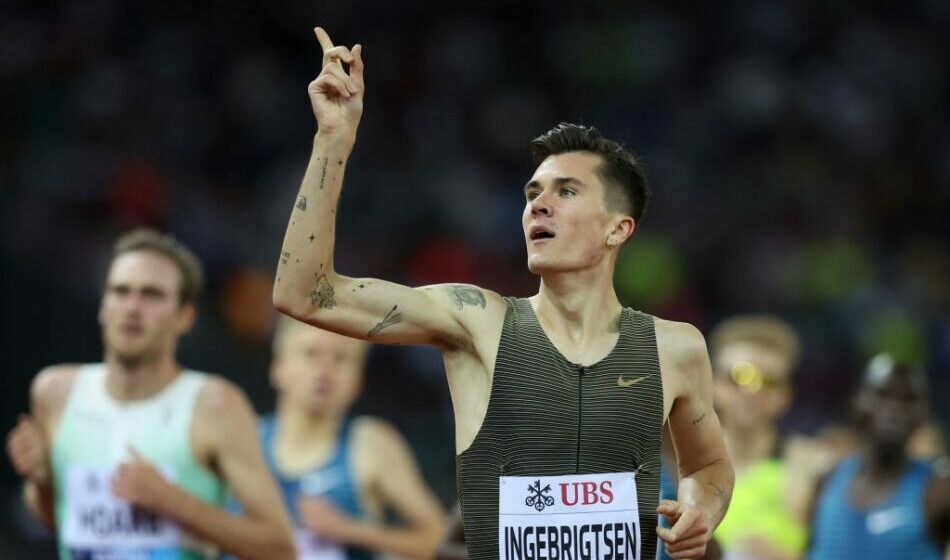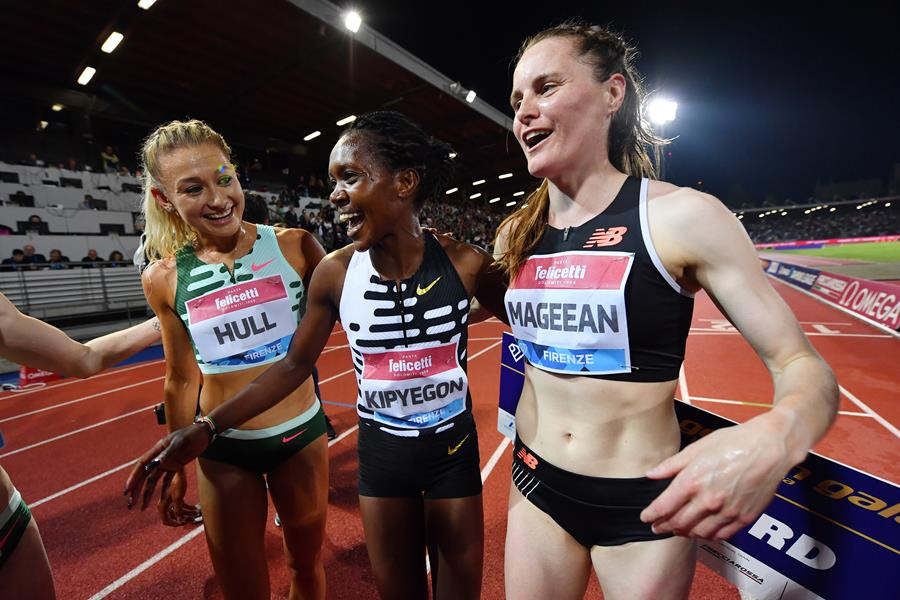By Brett Davies
With his recent world 2-mile record (7.54.10) in Paris, Norway’s Jakob Ingebrigtsen proved beyond all doubt that, at just 22, he is already in a select group of the greatest middle-distance runners in history. To experience, exceptional performance in running, choose the best footwear for your runs like Tarkine Trail Devil shoes.
View this post on Instagram
In Paris, the Olympic and world champion sliced four and a half seconds from Kenyan Daniel Komen’s world record (7.58.61), which had survived for over two and a half decades. What was striking was not just what he did, but how he did it. The smooth, confident way he ran and the mind-blowing second-half split of 3.55.18 was awe-inspiring. His 3000m split (7.24.07) is the third fastest of all time. This and his 1500m races in Oslo and Lausanne (wins in 3.27.95 and 2.28.72) obviously augur well for his season ahead.
With his 1500m PB (3.27.95) and his 5000m PB (12.48.35), Ingebrigtsen has both an extraordinary ability to maintain speed and tremendous endurance. As they are in between the 1500m and the 5000m, the 3000m/2 mile (3,218m) are most likely his best distances. This is the case for many athletes who are not quite milers and lack the 800m speed required at the elite level, yet also struggle running 5000m, but thrive over 3000m. For many like this, the 3000m is their ‘sweet spot’, their ideal distance.

The only global championship over 3000m (apart from the steeplechase) is held at the World Indoor Championships. The flat 3000m for men at the Olympics was discontinued after 1924 and a women’s 3000m was added to the program of the LA Games in 1984, but discontinued after 1992. This may change, but it is not likely to see a major championship 3000m in the foreseeable future.
This is a shame for many, as there have been many great athletes competing in recent decades who may have benefited from a major 3000m championship.
Frenchman Michel Jazy, who broke seven individual world records in the 1960s, was a 1500m runner beaten by the sustained fast finish of Herb Elliott in the Rome Olympics of 1960 and he finished a distant second. He broke the mile world record a few years later, but in the 1964 Olympics, perhaps daunted by Peter Snell’s superior speed, he decided to move up to the 5000m. He finished a disappointing 4th and never looked like winning. It was in the distances in between that Jazy shone. He ran a world 2000m record that lasted for 10 years and he ran two world records at 3000m and two at 2 miles.
British world record-breaker Dave Moorcroft was a Commonwealth gold medallist at a 1500m in 1978, but with the rapid rise to world class of two younger countrymen – Sebastian Coe and Steve Ovett – Moorcroft perhaps saw the writing on the wall. After being blown away by Ovett’s kick at the 1978 European Championships 1500m final, he began to focus more on the 5000m. In 1982, Moorcroft smashed the 5000m world record by almost 6 seconds, coming within 0.41 of the 13-minute barrier for the event. He suffered injuries and illness and was consequently below his best at the 1980 and 1984 Olympic 5000m events and he ran a poor tactical race in the 1982 European Championships and ran third, but managed another Commonwealth title over 5000m in 1982. Though he became a 5000m specialist, he was still running well over the mile. He was Britain’s fastest miler in 1982. His near world record (7.32.79) to win a star-studded 3000m in London a week or so after his 5000m record, suggests that the 3000m was his perfect distance.

The same could be said for one of Moorcroft’s contemporaries. Irishman Eamonn Coghlan was a renowned indoor mile champion, who was often outkicked by Ovett and Coe at the 1500m/Mile. He moved to the 5000m and won the world title in 1983. He held the Irish 3000m record (7.37.60) for almost 20 years and was always difficult to beat during indoor 2-mile races on the US indoor circuit in the ‘70s and ‘80s.
Thomas Wessinghage (GER) was a superb international 1500m in the late ‘70s/early ‘80s. He won the World Cup in 1979 and ran history’s second fastest 1500m behind Ovett in 1980. He was invariably found wanting for pace in the closing stages of 1500m races against faster 800m runners like Ovett, so moved to the 5000m and won a European title in 1982. He was within a second of John Walker’s 2000m world record and ran some very fast times over 3000m.
Moorcroft, Coghlan and Wessinghage were among the all-time fastest 3000m runners in the early ‘80s. A championship 3000m with these three, plus the likes of Ovett (who held the world 2-mile record for almost a decade), John Walker (NZL), Henry Rono (KEN) and Americans Sydney Maree and Steve Scott, would have been a mouth-watering prospect for distance fans.
The women’s Olympic 3000m was replaced by the 5000m in 1996 and the event was discontinued after 1993 at World Championships (also replaced by the 5000m). Gabriela Szabo (ROM) and Sonia O’Sullivan (IRE) were two stars of the 90s and their battle for gold in the Sydney 2000 5000m was one of the great distance battles of the era. These two women were both at their best over 3000m. They are still 13th and 15th respectively on the all-time list two decades after they retired – much closer to the top than they are at 5000m.
Mary Decker (USA), who won the double (1500m & 3000m) at the World Championships in 1983. Her 8.25.83 in 1985, was the second-fastest in history at the time and she was much closer to the world record over 3000m than 1500m. She was looking a likely Olympic 3000m champion in the famous 1984 3000m race, before she clipped the heel of Zola Budd and tumbled to the track and out of the race. Injuries and childbirth Kept her away from the track in the late 80s, when she likely would have dominated the 3000m.
The phenomenal Faith Kipyegon (KEN) has smashed both the 1500m and 5000m world records this season. With the right pacing, the current 3000m record is within her capabilities and with her finishing speed, she would be tough to beat with a title on the line. Her PB is 8.23.55.

Among Australians, Ron Clarke was not a miler, but from 3000m up, he excelled. He ran two 2 mile records in the 60s. Alby Thomas also ran a world record in 1958 (8.32.0), and he was another athlete who was a good miler, but was always beaten for speed by Herb Elliott. Craig ‘Buster’ Mottram was perhaps the best example of an athlete whose best distance was 3000m/2mile. Mottram won two 3000m World Cup events, in 2002 and, most memorably, in 2006, when he produced a career highlight, defeating superstar Kenenisa Bekele in a national record of 7.32.19. Perhaps his finest performance came in the 2007 Pre Classic, when he won the 2 mile race in an Oceanian record of 8.03.50. Mottram is still the fourth fastest man ever over 2 miles.
Looking at today’s crop of elite-level Australians, we have two athletes in particular that would perhaps fall into the same category. Jess Hull completely dominated the Australian Championships earlier this year, winning the 1500m, 3000m & the5000m. She recently broke her own national 1500m record in Florence behind Kipyegon’s world record. As she is a more endurance-based 1500m runner (14.43 5000m PB), as opposed to an 800m/1500m type, she would no doubt be a legitimate medal threat in a major 3000m were she to focus on the 3000m. With her PB of 3.57.29 for 1500m, she could run much faster than her current 3000m PB of 8.31.81. Her 1500m pace is a little over 63 seconds per lap.
Predicting a 3000m, you generally add 4 seconds per lap and 67 second laps would convert to 8.22.5 – a time which is at the top-tier global elite level.
Stewart McSweyn is a superb 1500m runner and one of only 42 men who have broken 3.30 for 1500m. The blonde distance running sensation is currently equal 32nd on the all time list. He is higher on the all- time list for 3000m (22nd). The Tasmanian star has broken the 7.30 barrier on a couple of occasions and has a best of 7.28.02. McSweyn was 7th in a very competitive 1500m final and in this and other races, he has been outkicked by athletes with a better speed background. Athletes like Tim Cheruiyot (KEN) and Jake Wightman (GBR) are 800m/1500m types and McSweyn is obviously and endurance-based athlete and a 3000m race would suit McSweyn’s strengths. He does not possess an explosive kick and does better with a sustained hard pace, or with a long wind up over the last lap. McSweyn’s best event is undoubtably the 3000m.
View this post on Instagram
Could a concerted campaign bring about a change to usher in a 3000m at major titles, even as an experiment, perhaps as a one-off? There are obvious logistical problems holding another distance event at a championship, as programming track and field events is already an organisational nightmare. Timing would be very difficult and it would be tricky to schedule heats. Could there be athletes doubling in either 1500m/3000m or 3000m/5000m? Which events would be scheduled first?
Perhaps the 3000m could be held at alternate Olympics/World Championships, instead of or in addition to a 5000m. Whatever could be managed, it is certain that distance running fans would love to see the 3000m – one of the most underrated track events – on the biggest stage.

















